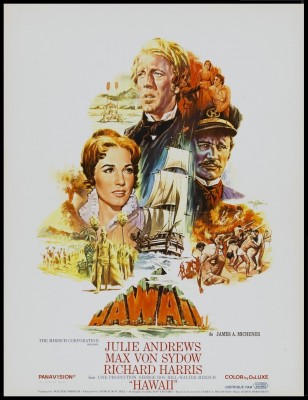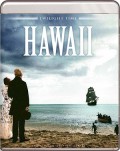| Reviews & Columns |
|
Reviews DVD TV on DVD Blu-ray 4K UHD International DVDs In Theaters Reviews by Studio Video Games Features Collector Series DVDs Easter Egg Database Interviews DVD Talk Radio Feature Articles Columns Anime Talk DVD Savant Horror DVDs The M.O.D. Squad Art House HD Talk Silent DVD
|
DVD Talk Forum |
|
|
| Resources |
|
DVD Price Search Customer Service #'s RCE Info Links |
|
Columns
|
|
|
Hawaii
The initially rocky production originated with Fred Zinnemann (High Noon) directing a script by his From Here to Eternity writer, Daniel Taradash. They departed during the early stages, replaced by formerly blacklisted writer Dalton Trumbo (Spartacus) and, an unlikely choice for director, George Roy Hill (Butch Cassidy and the Sundance Kid, The Sting). Despite a few minor concessions, such as having Julie Andrews briefly sing in an early scene, the picture, like its protagonist, is pretty uncompromising itself, its story depressingly if deliberately contrasting the movie's gorgeous locations, production design, and costumes.
Unfortunately, the 1080p video transfer (in its 162-minute general release version) provided by MGM is mediocre at best. The image is extremely soft while exhibiting the kind of edge-enhancement one used to see a lot on DVD. The original cinematography was, expectedly, given its setting, gorgeous, but here the colors are flat and lifeless and there's a strange fringing/flaring effect in some shots. Compared to other 35mm Panavision films from this period (roughly speaking, the second half of the 1960s) out on Blu-ray, this is one of the weakest I've ever encountered, weaker even than Fox's tepid Planet of the Apes (1968). A complete roadshow version is offered, but it's a very old standard-def transfer (complete with MGM/UA Communications logo) that's 4:3 letterboxed, with thick borders on all four sides on 16:9 TVs and projectors. It actually looks a little better than I was expecting, but is offered primarily so that interested parties can view scenes cut from the general release version, rather than re-watch the entire film.
Hawaii follows a band of New England missionaries committed to helping the Western-educated Prince Keoki (Manu Tupou) spread Christianity and bring order to the Hawaiian Islands. Reverends Quigley (John Cullum), Whipple (Gene Hackman), and Hewlett (Lou Antonio), all in great costumes but exceptionally bad wigs, are accepted at once, but Abner Hale (Max von Sydow), a gaunt, awkward Calvinist, is single and mentor Reverend Thorn (Torin Thatcher) must arrange a prospective marriage to young Jerusha (Julie Andrews), the daughter of colleague Charles Bromley (Carroll O'Connor). To Abner's great shock, she agrees to marry him and make the perilous journey to the other side of the world.
(No one seems to notice that Abner speaks with a thick Swedish accent, despite having American-born parents, or that Jersuha has an English one in her otherwise American-accented family. Affectations?)
Abner, accompanied by Jerusha, is assigned to the island of Maui, where enormous Queen Malama (Jocelyne LaGarde) rules with a mix of pragmatism, a resistance to change that might upset her subjects, and a childlike need for instant gratification. Certain aspects of the native culture shock the Hales: incestuous marriages are encouraged, while the killing of newborns with only minor birthmarks is considered humane. The natives, in turn, are bemused by the White Man's strict and, to their eyes, often hypocritical morality. Queen Malama takes an instant liking to Jerusha, whose natural warmth, polite directness, and instinctive approach to the natives as equals wins many near-converts, but Abner's extremism just as quickly drives them away. Meanwhile, in a coincidence much too outrageous to be believed, Jerusha bumps into her former fiancé, whaler Rafer Hoxworth (Richard Harris), who wants to take Jerusha back to civilization.
Ironically, Hawaii, for all its gloss, seems meatier than it must have 50 years ago. Today religious extremism and intolerance among major faiths seems to permeate all facets of 21st century life, from 9/11 to the 2016 U.S. Presidential race, from domestic acts of terrorism such as abortion clinic bombings to bizarre faith-based disruptions of commercial flights by ultra-Orthodox Jews. Indeed, this evangelicalism has, disturbingly, spread even to non-religious issues, from gun control to climate change: science, history and statistical analysis on one side, and inflexible, religious faith-like intransigence on the other.
Abner's conflict, as in all these other cases, is rooted in the same orthodoxy. His strict Calvinism is the only path to salvation. The slightest deviation is a one-way ticket to eternal damnation. That the native Hawaiians had a generation earlier not even an awareness of Christianity does not matter. Nor does, as Jerusha points out, the fact that these Hawaiians are a good and gentle people who've enjoyed peace and harmony for the many decades prior to the white man's arrival. (As depicted in the film, at least. As reader Sergei Hasenecz notes, "Pre-colonial Hawaii had its share of tribal wars of conquest and slaughter as well. And let's not forget the practice of human sacrifice.") As the screenplay suggests, eventually Abner's refusal to make any allowances at all says less about the Hawaiians casual attitude toward Christianity than it becomes a personal test of Abner's unflinching faith in extreme circumstances. And much of this faith-testing really boils down to simple intolerance and bigotry masked behind God's "commandments." Any deviation on his part and he rejects the totality of his own evangelism. The results are disastrous for everyone orbiting Abner's universe.
The rich film tries to cram other issues into its narrative, these suffering some of the biggest cuts for the general release version. Other missionaries (primarily played by Gene Hackman and Lou Antonio), assigned to Hawaii's other islands, fall from grace by marrying native women or by committing other unpardonable offenses. They profess a love for Hawaii and its people yet become corrupted capitalists that pillage the island of its natural resources and indirectly introduce heretofore unknown diseases like measles that kill to the point of genocide-by-proxy.
The attention to period detail is unusually good. The 1820s is a decade of American history not often explored in movies, and the look of the sets and costumes seem particularly authentic. (It's odd, however, to see actors like Hackman and O'Connor in a period film; we've since come to think of them as singularly contemporary actors.)
The voyage to Hawaii is very well done, at times quite thrilling. Scenes were shot aboard a real schooner, and the violent heaving of the ship with the real actors aboard (not stuntmen) adds to the authenticity. (One of them, recognizable even in long shot, is a young Bette Midler.) A storm at the Strait of Magellan is depicted with elaborate traveling mattes.
In the pivotal, Bergman-esque role Max von Sydow is excellent, even though the writing is nowhere near that level of probing and perceptiveness. Hawaii is not one of Julie Andrew's great parts, though it's certainly a showy one. Her character is refreshingly direct among all the obstinate missionaries and their prudish wives, but - as in the novel - she's also too passive in her relationships with the men in their life, men the audience wonders why she would be attracted to in the first place.
Non-professional actress Jocelyne LaGarde, in her only film, steals the film as Queen Malama, a characterization unique in all of cinema. She's fascinating throughout and deservedly won the hearts of the film's many fans.
Video & Audio
Hawaii's unaccountably poor transfer isn't a deal-killer but comes close. For reasons described in more detail above the image is soft and bland throughout, never once taking full advantage of the high-def format, instead resembling an above-average 16:9 enhanced DVD. The reasons for this are not known; possibly the original camera negative was unusable through over-printing but, regardless, the film warrants some effort and funding to restore it to a more acceptable state.
The soundtrack, DTS-HD Master Audio English mono has its problems, too. Some reports indicate that Hawaii may have been released theatrically in mono only, even in 70mm blow-up venues, and that a stereo mix was created much later for home video and television syndication. Whatever is true, the mono mix is okay but wanting. Unlike the earlier DVD, the overture and exit music are not included on the general release version. Optional English subtitles are available and the disc is region-free.
Extra Features
Supplements include the previously mentioned roadshow version in standard-definition; an original trailer in HD; an isolated score track; and Julie Kirgo's usual liner notes. Missing is a short supplement included on the DVD: The Making of "Hawaii", a 9-plus-minute featurette that probably ran once on network television.
Final Thoughts
It's screenplay more interesting now than 50 years ago when it was new, Hawaii is generally very good, but the transfer is extremely disappointing, if watchable. Recommended.
Stuart Galbraith IV is the Kyoto-based film historian and publisher-editor of World Cinema Paradise. His new documentary and latest audio commentary, for the British Film Institute's Blu-ray of Rashomon, is now available.
|
| Popular Reviews |
| Sponsored Links |
|
|
| Sponsored Links |
|
|
| Release List | Reviews | Shop | Newsletter | Forum | DVD Giveaways | Blu-Ray | Advertise |
|
Copyright 2024 DVDTalk.com All Rights Reserved. Legal Info, Privacy Policy, Terms of Use,
Manage Preferences,
Your Privacy Choices | |||||||














